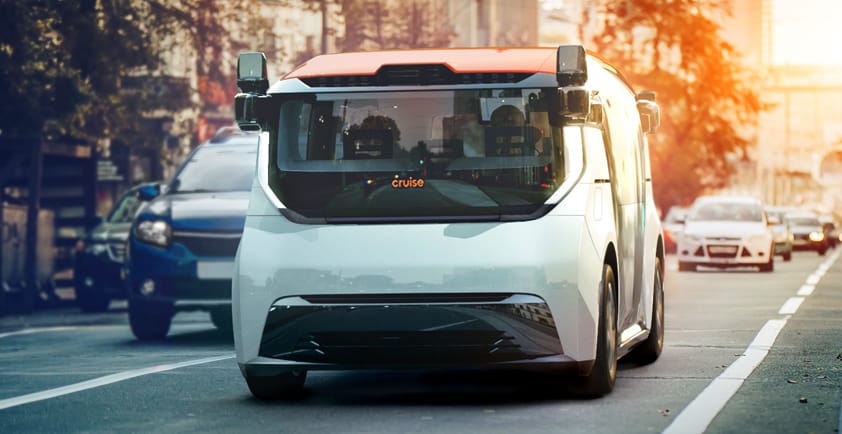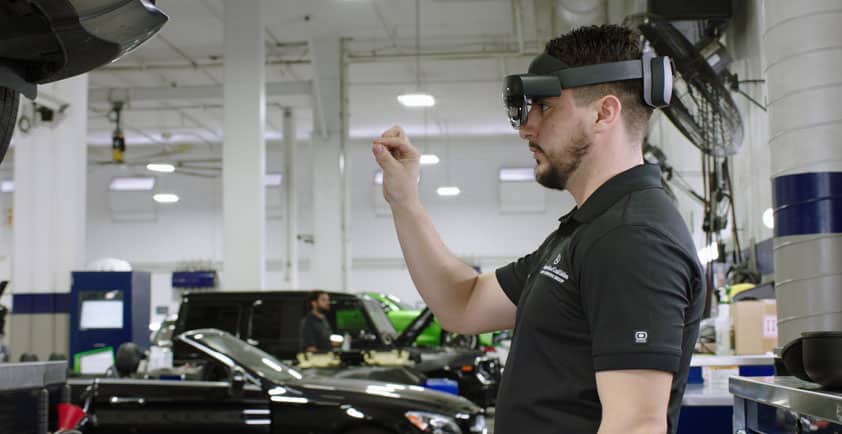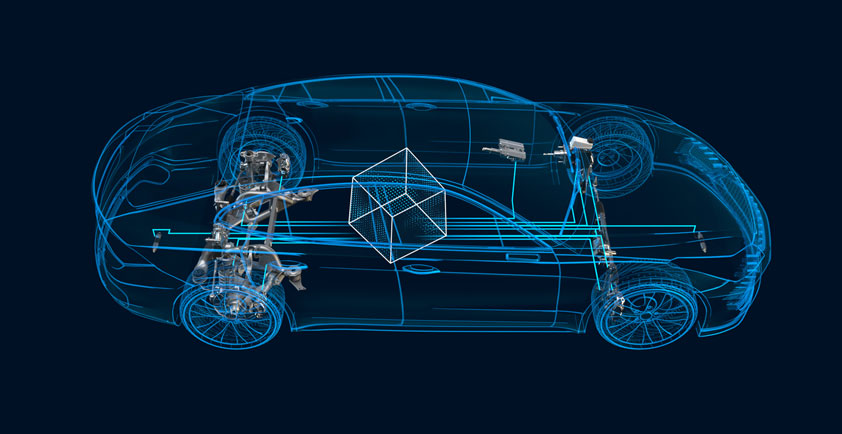

DAIMLER AG – DIGITAL TRANSFORMATION WITH BIG DATA AND AI
Daimler AG’s requirements for data protection and data security go above and beyond the statutory provisions. Consequently, the task of cloud migration represented quite a challenge for the successful automotive corporation – that is, until those in charge learned about Azure Key Vault. This solution allows them to keep the cryptographic keys entirely in their own control and to enable fast, worldwide access to their big data applications, which are in high demand across the entire corporation.
Daimler AG is one of the world’s most successful automotive companies. As the parent company of Mercedes-Benz Cars, Daimler Trucks, Mercedes-Benz Vans and Daimler Buses, Daimler is one of the largest providers of premium cars and the largest commercial vehicle manufacturer in the world. Daimler Financial Services offers financing, leasing, fleet management, insurance, financial investment funds and credit cards, as well as innovative mobility services.
The automotive industry has long since moved on from the mindset of “higher, faster, further” – in other words, more horsepower, more speed and more features. At the heart of Daimler’s efforts are the specific needs and desires of drivers and the continual improvement of product quality. As the company is active worldwide in a broad range of customer segments, the requirements and profiles of their customers are correspondingly diverse – a classic field of application for big data analyses.
In fact, Daimler took its first steps towards big data a number of years ago. Guido Vetter, Head of Corporate Center of Excellence Advanced Analytics & Big Data and his team built up significant server capacities in their own data centre in Germany, which allowed them to develop their first data-based business applications based on a platform they developed in-house to meet the challenges they faced. Big data is useful in the after-sales area, for example, in order to reduce the amount of time vehicles have to spend in the repair shop. A piece of software can use the log files generated by a car to predict which repairs will be necessary. As a result, technicians don’t need to spend so much time investigating the cause of the problem, as a computer provides them with targeted suggestions. These are, in turn, derived from historical data on error patterns, which serve as a basis for an algorithm developed via big data analysis. The algorithm then uses the log files from the current vehicle to determine the likely cause of the error.
No cloud migration without data protection
The platform that was developed in-house proved to be a resounding success. Increasing numbers of users wanted to access the platform to run analyses to identify logical connections in their business data. “An on-premise solution wouldn’t have offered sufficient flexibility. It would have been nothing more than a dead end”, says Guido Vetter. He adds, “It would have taken too long to implement and would also have been too costly. A cloud solution is what we needed to implement an efficient and effective global rollout.”
For a long time, however, data protection and data security represented obstacles in the path of the company moving to the cloud. The data processed by Daimler on the platform includes personal data as well as highly confidential business-critical data. The company therefore applies data protection and IT security standards that go above and beyond the legal provisions. “Safety first” and “The best or nothing” are mottoes that Daimler applies not only to the vehicles it develops but also to its data. It was the case for a long time that cloud solutions were simply unable to meet these standards.
But then the big data experts at Daimler learned about Azure Key Vault. “It was immediately clear to us that, with this encryption management solution and the many additional security measures in Azure, we would be able to meet our own rigorous requirements for data protection and security”, says Vetter. Thanks to Key Vault, Daimler is able to keep all cryptographic keys entirely within its own control, enabling the company to encrypt and decrypt data as needed, without having to make any modifications to the cloud platform. The advantage here for Daimler is that it can benefit from the speed of development offered by Microsoft and can start using new or improved services immediately without any delays due to modifications.
In terms of security, Guido Vetter believes that Daimler and Microsoft share “almost identical DNA”. In the same way that Daimler would never put an untested car on the road, Microsoft never puts any half-finished software into operation. Accordingly, Microsoft Azure already came with all of the ISO certifications relevant for Daimler and all additional services required by Daimler were market-ready.
In addition to the high level of data security it enjoys, Daimler also benefits from the other advantages offered by the Microsoft cloud – virtually unlimited scalability, global availability and no costs for operating and configuring services. “Here at Daimler, we can focus on our user competence in relation to big data, while Microsoft brings its expertise to bear on the further enhancement and operation of cloud services”, explains Michael Drzymala, Senior Manager Product Management me assist & BigData.
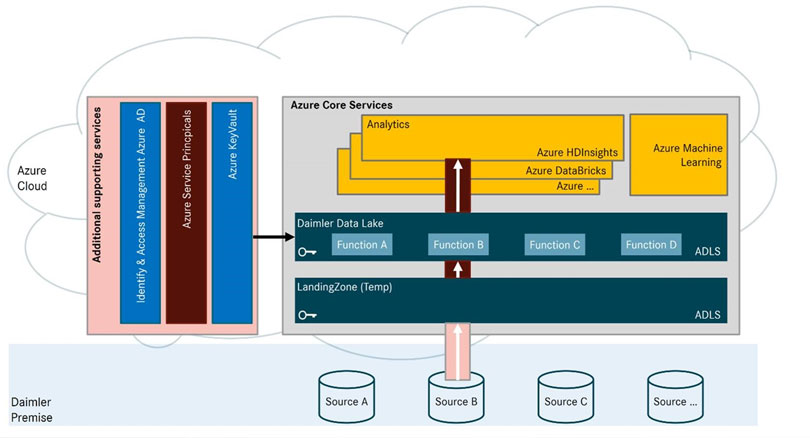
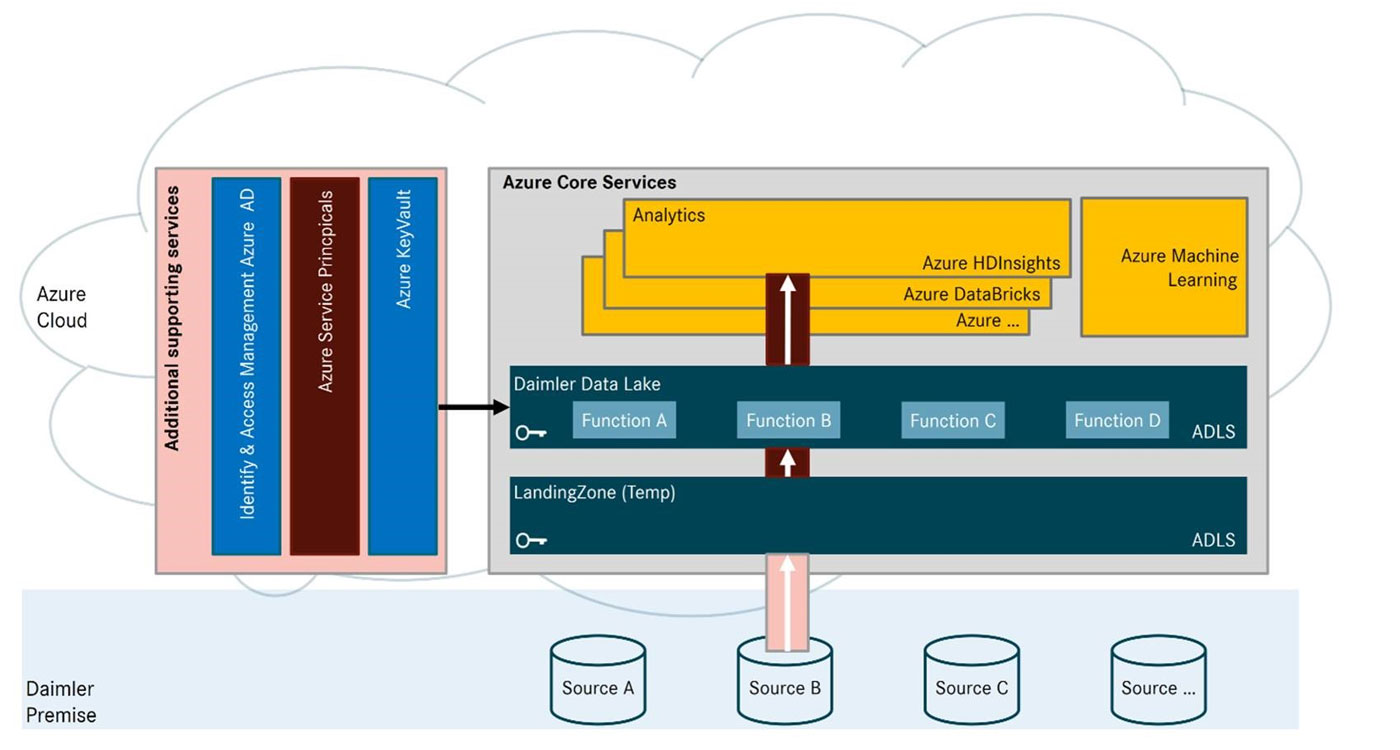
eXtollo is launched – and wows expert users across the globe
Once the Board of Management of Daimler AG assessed the cloud migration in terms of legality and risk and granted its approval, everything happened pretty quickly. After just nine months, the big data platform, which was given the name eXtollo, was available in the cloud – worldwide, for every Daimler employee. In the past, it would have taken years for the previous platform to be made available within just one region.
Azure was also impressive in terms of cost. The processing capacities required for big data analyses are vast – but are also only needed on a sporadic basis. As Azure customers only pay for the computing power they actually use, the big data experts at Daimler say that the Microsoft cloud solution cannot be beaten in terms of value by any comparably powerful on-premise infrastructure. Storage capacity is also much more reasonable. Daimler now pays 30 percent less than it previously did for local storage capacity – but in return enjoys five times the storage volume. This data lake for the entire Daimler corporation permanently stores all data required by the platform and computing power is only accessed when a user initiates processing of a workload.
An unexpected but very welcome side effect of cloud migration has been increased satisfaction among colleagues. Vetter recalls that the limitations of the on-premise platform meant that, in the past, there was always some degree of dissatisfaction in terms of performance, availability and scalability. In the cloud, there are no longer any limits per se and so the IT specialists can meet all user requirements, thereby enhancing their reputation in terms of credibility and reliability. The Big Data team is now in a position to offer all its internal customers solutions to problems along the corporation’s entire value chain – from Research & Development, Production and Logistics, to Financial Services, Sales and After Sales.
"An on-premise solution would have been nothing more than a dead end for us, as it would have been too inflexible as well as very expensive. A cloud solution is what we needed to implement an efficient and effective global rollout." Guido Vetter: Head of Corporate Center of Excellence Advanced Analytics and Big Data - Daimler AG
Sights set on artificial intelligence
The cloud-based eXtollo platform serves as a perfect example of how, within the Daimler corporation as a whole, the cloud can prove to be cost-efficient and scalable. As a result, colleagues are increasingly turning to Guido Vetter's team for assistance with their own cloud projects.
The specialists at Daimler attach importance to the topic of artificial intelligence (AI) because the company’s internal AI expertise is growing all the time. “We expect that artificial intelligence and machine learning will bring benefits such as a better, more efficient evaluation of our data,” says Michael Drzymala. Here, too, Azure is already on-hand to support Daimler AG with turnkey services.
“In future, we will be able to set up cross-functional development projects throughout the corporation for the first time ever, thanks to the cloud. As a result, the Cars and Trucks divisions can jointly develop and used data. This allows colleagues to benefit from the mutual transfer of knowledge between departments”, says Guido Vetter. He and his team have already proven that developers don’t need to waste any time worrying about protecting their strictly confidential data with eXtollo.




